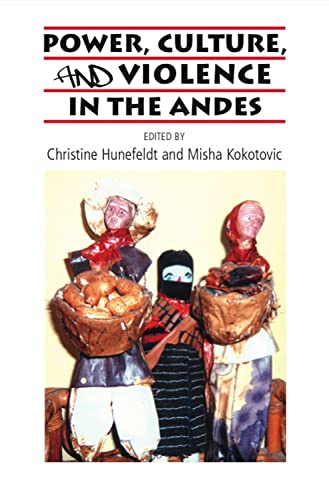Críticas:
"This book emerged from a conference organised at the Centre for Iberian and Latin American Studies at the University of California, San Diego. Each author examines the dynamics between power, culture and violence in the Andes from different theoretical and disciplinary perspectives and based on different case studies; all deal either with Peru or Bolivia . . . On the whole, the second section contains the best essays. Misha Koskotovic demonstrates how Mario Vargas Llosa's literary production has veered to the ideological right through his reinterpretation of the mistreatment of the cacique Jum, a pivotal event in The Green House and a later book, The Storyteller. She points out the way in which Vargas Llosa's understanding of violence against the natives changed to one in which he considered it an inevitable, and in the long term positive, consequence of modernisation. Miguel La Serna's chapter on the violence between the neighbouring communities of Chuschi and Quispillaccta (Ayacucho) prior to the Shining Path insurgency is one of the best of the volume. In a very fully documented and densely argued essay, La Serna suggests that the violence that exploded after the 1980 Shining Path declaration of war was most of all a manifestation of inter-communal hostility among Andean indigenous communities. . . . The last two essays concern Bolivia. Herbert Klein provides a masterful reinterpretation of indigenous political participation after the 1952 Revolution, asserting that the electoral triumph of Evo Morales 'is not an accidental phenomenon nor is it the national progression of political awareness typical of emerging groups within the Latin American political scene' (p. 145). Rather, Klein shows that after the 1952 Revolution the Movimiento Nacionalista Revolucionario accepted the indigenous communities as peasant unions and gave the vote to illiterates, leading to the emergence of peasants into national politics. Initially, the peasants supported white minority governments in return for their backing of the 1953 agrarian reform and agrarian price supports. This schema broke down in 1974 when the Banzer dictatorship attacked peasant protestors. The 1970s brought about the rise of urban Indians, in particular in El Alto, perched above the city of La Paz, and a growing identification of the Bolivian popular classes as indigenous. It was Evo Morales who was able to harness the potential of the indigenous political majority, through the cocalero movement that survived by creating broad alliances with national and international progressive groups. In addition to being inclusive (unlike his rivals in the Aymara indigenist movement) through the Movimiento al Socialismo (MAS) party, Morales' redefinition as an Aymara contributed to his soaring political fortunes. As Klein shows, the rise of the indigenous component of the Bolivian population was possible because of Morales' predecessor. President Gonzalo S nchez de Losada's decentralisation campaign brought power to the countryside and the destruction of the old parties. This finally led to a majority of the Bolivian electorate voting for Morales and MAS. Nancy Postero's chapter on the symbolism and use of Andean utopias complements well Klein's more structural essay. She traces the history of Andean utopian visions and Morales' use of them, analysing the advantages and disadvantages of such utopian rhetoric." --The Journal of Latin American Studies "Although this volume is mainly dedicated to Peru, with just two chapters on Bolivia, the collection delivers a novel interdisciplinary analysis that examines the long-term nature of cultural violence as well as the diversity of experience, in space and time. ... this volume is a very accomplished study which will prove invaluable to those seeking to understand Andean societies." --Bulletin of Spanish Studies "Cultural symbols that challenge existing power structures in the Andean region grace the covers. Hunefeldt and Kokotovic introduce eight papers by colleagues that present interdisciplinary perspectives on responses - including insurrectionist groups like the Shining Path in Peru, and conservatives' rejection of the neoliberal policies that led to the popular election of Bolivia's first indigenous president - to the region's great economic divide between the poor and well-off, relationship between ethnicity and economic class, and recent transformations in the dynamics of political power." --Reference & Research Book News
Reseña del editor:
Scholars from Anthropology, History, and Literary and Cultural Studies present their current research on culture and violence in the Andean region. Within an interdisciplinary approach, the contributors to this volume explore the complex and mutually constitutive relationship of culture and violence in Peru and Bolivia, countries with large indigenous populations who have largely preserved their culture and way of life in spite of centuries of colonial domination and the encroachment of capitalist modernization, including its latest free-market variant. The intertwined histories of culture and violence in the Andes are examined through analyses of the indigenous and popular mobilization that brought Evo Morales to power as Bolivias first indigenous president, conservative Latin American intellectuals' response to this popular rejection of neoliberal economic and social policies, the work of Peru's Truth and Reconciliation Commission and the legacy of the Shining Path war, and nineteenth-century intellectual and political discourses on race, gender, and the incorporation of indigenous peoples into the nation-state.
„Über diesen Titel“ kann sich auf eine andere Ausgabe dieses Titels beziehen.


